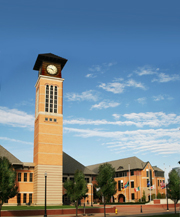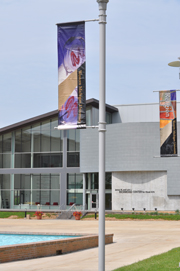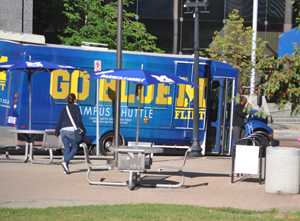Reprinted with persmission from The Review magazine
In order for Michigan cities to sustain vibrant economies and healthy communities, they must implement bold strategies that ensure more of the residents attain college degrees and valuable postsecondary certificates.
A recent study by CEOs for Cities found that 58 percent of a region’s economic health comes from the educational attainment of its residents. Another one from Georgetown University predicts that 62 percent of all Michigan jobs will require postsecondary education by the year 2018.
The benefits of increased levels of education to cities are substantial. Per capita income increases, and subsequently so do tax revenues. Unemployment goes down and so does reliance on public benefits. Crime goes down and volunteerism goes up. The demand for a more highly skilled workforce is growing—and municipal leaders have a unique opportunity to be a part of the supply-side solution.
According to the National League of Cities (NLC), municipal officials are uniquely positioned to form new partnerships with leaders in K-12 and higher education, workforce development, and business to increase postsecondary completion rates.With support from Lumina Foundation, NLC’s Institute for Youth, Education and Families has developed a new series of publications highlighting city strategies to increase local college completion rates. They have also analyzed the role that mayors are playing to support college access and success in their cities. In the last few years, municipal leaders in dozens of cities have launched new, multi-sector collaborations to dramatically increase the proportion of residents in their communities who obtain postsecondary degrees and credentials. City officials are increasingly focused on postsecondary success as a core component of their economic development strategies.
In Michigan, municipal leaders have the opportunity to leverage new resources for their communities by joining a growing coalition of networks committed to ensure more of their residents pursue and complete education beyond high school.
In 2008, a group of high-level leaders representing K-12, higher education, business, government, nonprofit organizations, and philanthropy, began meeting to discuss the possibility of establishing a statewide network responsible for galvanizing an educational attainment movement in the state.
Michigan College Access Network (MCAN) formally launched in 2010 with support from federal, state, and philanthropic funding and was charged with increasing Michigan’s educational attainment rate to 60 percent by the year 2025. Only about 36 percent of Michigan adults aged 25-64 possess at least an associate degree (to find your county’s rate, visit www.luminafoundation.org/state/Michigan/).Local College Access Networks
Just three years later, MCAN is now supporting more than 50 communities’ efforts to mobilize leadership and resources around the goal of increasing the educational attainment of their citizens with a focus on aligning systems around college readiness, college participation, and college completion rates. Far too many Michigan students don’t pursue higher education after high school—and many that do, don’t ever complete a degree because they aren’t socially, academically, informationally, or financially prepared. MCAN helps communities build cross-sector strategic alliances, known as Local College Access Networks, or LCANs.
Each LCAN:
• Agrees on a vision;
• Establishes clear college readiness/
participation/completion goals;
• Aligns and coordinates existing organizations to shared goals to fill differentiated roles;
• Implements a collaborative action plan based on data-driven community priorities; and
• Tracks progress on goals transparently and holds partners accountable for results.
Communities throughout Michigan are designing and implementing innovative strategies to boost college attainment via their LCANs. In Newaygo County, community leaders have raised enough funds to place full-time college advisers in each of their high schools to provide one-on-one assistance guidance to all graduating seniors. Benton Harbor, Hazel Park, Lansing, Pontiac, and Saginaw have all launched universal place-based scholarships to all students inspired by the Kalamazoo Promise. Muskegon County and St. Clair County are each leading major public awareness campaigns to build a college-going culture.
Bay City and Jackson both opened college access resource centers where students and families can visit to get advice and resources on postsecondary educational opportunities. Escanaba has identified former students who are not enrolled in college but are within 12 credits from an associate degree and supports them to complete the degree. Sturgis recently launched a 10-year strategic plan for the city and has lifted up their LCAN as their primary workforce development strategy. Detroit and Grand Rapids are both participating in a national competition to demonstrate the largest increase in postsecondary completion—the winner will get a $1 million prize to launch a national promotional campaign highlighting local efforts.
Steps Municipal Leaders Can TakeIn their recent respective publications, both MCAN and NLC have outlined a set of action steps for municipal leaders who are concerned about low college completion rates and want to identify and advance solutions. As a first step, local officials can convene leaders from across sectors to develop a more coordinated strategy to provide students will supports and services they need to graduate with a postsecondary credential.
Additional action steps mayors/presidents should take include:
• Conducting an inventory or scan of local college access and success efforts across sectors, institutions, and community partners;
• Hosting consultative sessions to listen to the perspectives of various stakeholders;
• Establishing a leadership structure to guide and sustain college access and completion efforts;
• Seeking consensus regarding measurable outcomes and key benchmarks or milestones to assess progress;
• Creating data sharing agreements and protocols in order to assemble a fuller picture of the municipality’s education pipeline;
• Developing and implementing action plans that have the potential to “move the needle” on college completion; and
• Persistently raising awareness and celebrating early victories to build and sustain momentum.
To read more about the NLC Postsecondary Success Action Guides, go here.
For Michigan municipal leaders, MCAN can provide grant funding, hands-on technical assistance, and additional tools to interested funding. For more information, visit www.micollegeaccess.org.
Brandy Johnson is the executive director of the Michigan College Access Network. You may reach her at 517-454-1387 or brandy@micollegeaccess.org. Marjorie D. Cohen is a senior associate at the National League of Cities Institute for Youth, Education and Families. You may reach her at 202-626-3052 or cohen@nlc.org.






